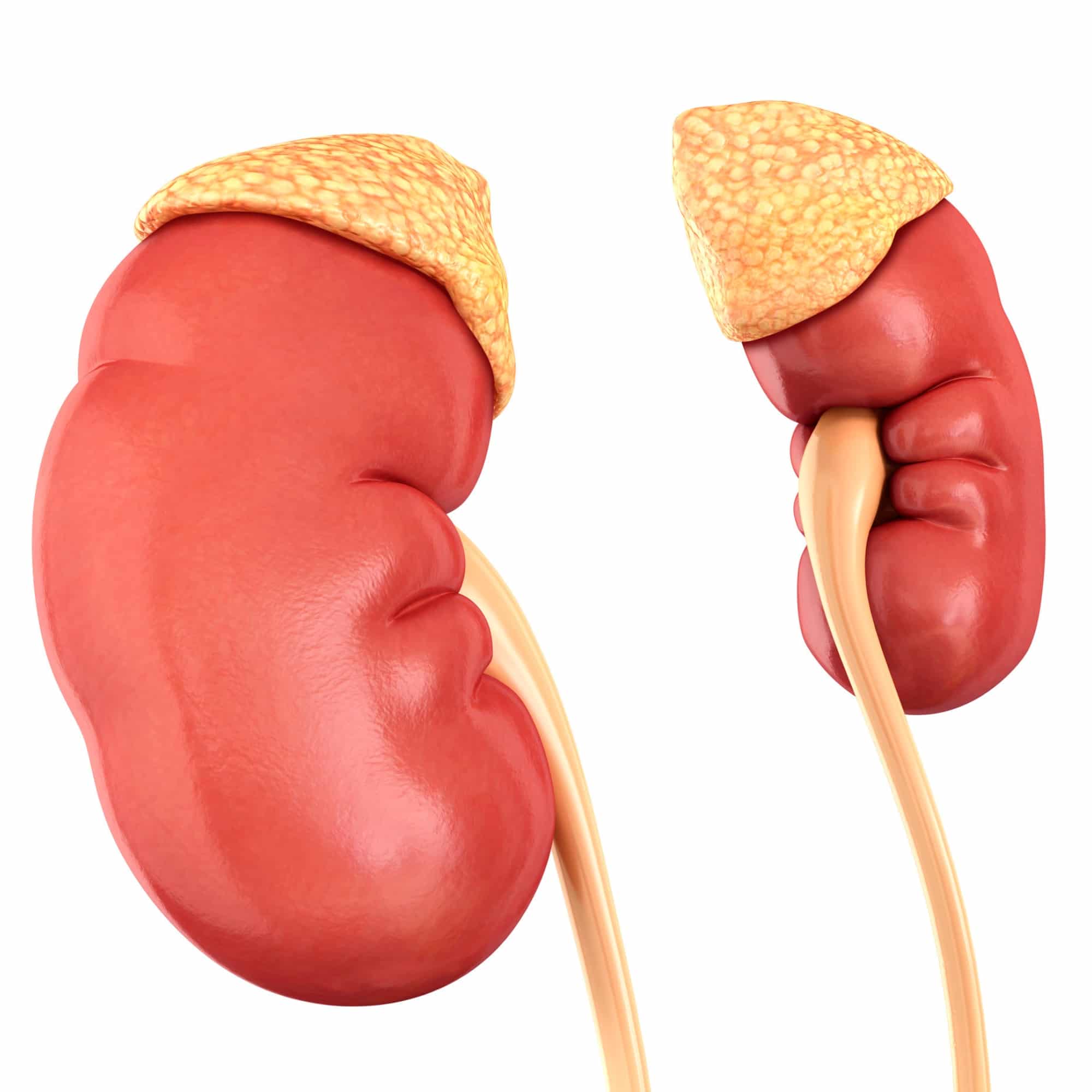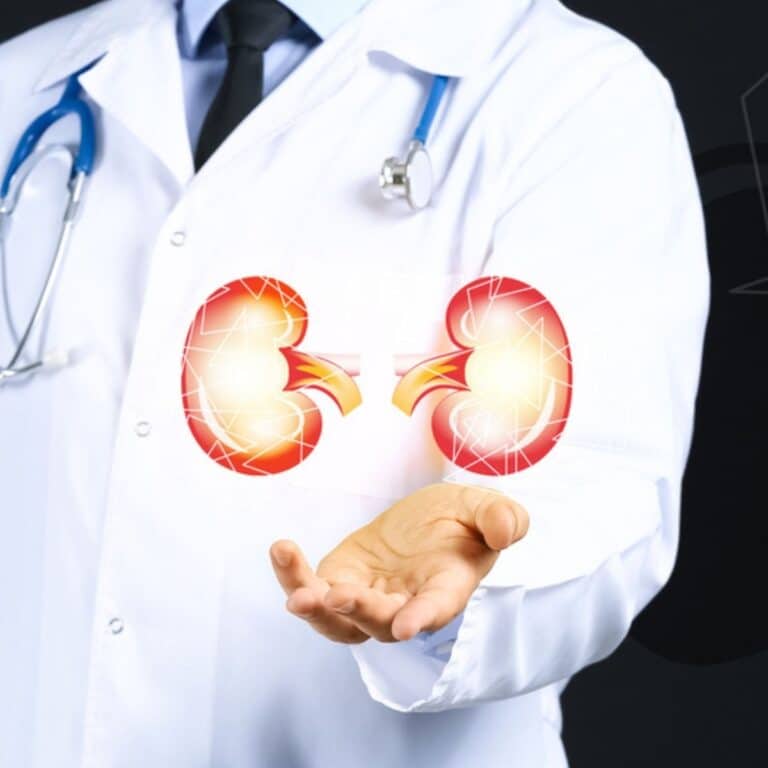Top 5 Signs of Kidney Failure
You're caring, committed, and eager to help others. It's crucial you recognize the top five signs of kidney failure. Whether you're a health professional or a loved one, knowing what to look for can make all the difference with Chronic Kidney Disease. It's vital that you take care of these 2 bean-shaped organs.
From understanding flank pain to recognizing unusual urination patterns, we're here to guide you. Let's dive into the world of kidney health together, empowering you with the knowledge to potentially save a life.

Jump to:
- Key Takeaways
- Understanding Kidney Failure
- Recognizing the Symptoms
- The Role of Flank Pain in Kidney Failure
- The Importance of Edema
- Unusual Urination Patterns
- The Underlying Causes of Kidney Failure
- How Kidney Failure Is Diagnosed
- Treatment Methods for Kidney Failure
- Preventive Measures Against Kidney Failure
- FAQs for Signs of Kidney Failure
- Top Signs of Impaired Kidney Function To Be Aware Of
Key Takeaways
- Recognizing kidney failure symptoms early is crucial for effective management and treatment.
- Dietary adjustments, such as reducing sodium and protein intake, can help alleviate the workload on the kidneys.
- Adequate hydration and regular exercise promote kidney health and improve overall body function, no matter the stage of kidney disease.
- Seeking medical attention and diagnosis through tests like blood tests and imaging is essential for proper treatment and management of kidney failure.
For More Recipes and Ideas --->> Get Your Free Meals and Recipes That Are Perfect for Pre-Dialysis Diets, Pre-Dialysis with Diabetes, or Dialysis Diets.
Understanding Kidney Failure
As we turn our attention to 'Understanding Kidney Failure', it's important to remember that this condition is marked by certain symptoms and requires specific treatment options, no matter the stage of chronic kidney disease.
You'll find that recognizing these symptoms early can significantly aid in managing the disease. You can catch these symptoms early by getting regular screenings, even if you think you have healthy kidneys.
Moreover, understanding the available treatment options can help you make informed decisions about your health.
Kidney Failure Symptoms
In your journey toward understanding the history of kidney failure, you'll need to be aware of the signs, symptoms, and complications that could arise from chronic kidney disease. Management strategies such as dietary adjustments, hydration importance, exercise benefits, sleep's role, and stress management can help in mitigating these symptoms.
Here's a quick reference table:
| Management Strategy | Benefit |
|---|---|
| Dietary Adjustments | Helps reduce kidneys' workload |
| Hydration | Assists kidneys in filtering blood |
| Exercise | Improves overall body function |
Treatment Options
You've picked up on the signs of kidney failure, some of you in the earlier stages, and now it's time to delve into the treatment options that can help manage this condition.
These include conventional medical treatments, but also, don't underestimate the value of alternative medicine such as herbal therapies. Certain herbs may assist in improving kidney function, but always consult your doctor first. A health care professional is always the best one to talk about your condition.
A kidney-friendly diet, low in sodium and protein, can also help manage this condition. Exercise offers multiple benefits, including maintaining healthy blood pressure levels and promoting overall kidney health.
Lastly, don't overlook the emotional assistance that support groups can provide. Sharing your experience and learning from others can be invaluable in managing kidney failure. Always remember, you're not alone in this journey.

Recognizing the Symptoms
Recognizing the symptoms of kidney failure is key to early detection and optimal treatment.
As you learn to identify early warning signs, you'll understand the severity of each symptom and how it relates to the progression of kidney disease.
In the following sections, we'll unpack these complex medical concepts to provide a clear understanding. Keep in mind that you always have a right to get proper treatment and a treatment choice.
Identifying Early Warning Signs
While it's crucial to maintain overall health, it's equally essential that you're aware of early warning signs of kidney failure to seek timely treatment. Paying attention to the dietary impact is key, as certain foods can exacerbate kidney issues. Be mindful of your blood pressure control, as hypertension can significantly harm your kidneys.
Hydration importance can't be overstated; adequate water intake helps your kidneys clear sodium and toxins from your body. Preventive vitamins such as B-vitamins and vitamin C aid kidney function. Stress management also plays a role.
Chronic stress can spike your blood pressure and indirectly harm your kidneys. You also should look for signs of edema, or extra fluid on your body.
Don't disregard these warning signs. Your vigilance could make the difference between health and disease.
Understanding Symptom Severity
Often, you'll notice symptoms of kidney failure gradually increasing in severity, but it's crucial to understand that they can also suddenly appear. Knowing how to recognize these symptoms allows you to take preventive measures such as adopting kidney-friendly exercises and proactive hydration, which could significantly slow down the disease's progression. It might be acute kidney failure instead of chronic kidney disease.
The mental health impact of kidney failure shouldn't be overlooked either. Stress, anxiety, and depression are common as the body adjusts to dietary implications and the disease's physical effects. Seeking assistance from mental health professionals can be beneficial.
Lastly, alternative therapies like acupuncture or massage can alleviate some symptoms and enhance overall well-being. Remember, understanding symptom severity is a proactive step towards managing kidney failure effectively.
The Role of Flank Pain in Kidney Failure
You might experience flank pain, a common symptom of kidney failure, as discomfort on one or both sides of your lower back.
Understanding how to identify this pain can help you recognize early signs of kidney problems.
Additionally, knowing effective pain management strategies can make this condition more manageable for you.
Flank Pain Identification
Flank pain can be identified through various sensations, ranging from a dull ache to a sharp, stabbing feeling. It is typically localized on one side of the body, between the upper belly area and the back. This discomfort can be an indication of kidney failure.
In addition to physical symptoms, flank pain can also have psychological effects, causing stress and anxiety. Engaging in flank pain exercises, such as gentle stretching, can provide some relief. Other non-medication remedies, like applying heat or ice, can also be helpful.
However, it is important to note that persistent flank pain should be evaluated by a healthcare professional. There are pain relief options available, so it is crucial not to hesitate in seeking medical attention.
Pain Management Strategies
In managing the flank pain associated with renal failure, you'll find that a balanced combination of self-care practices and medical treatments is often the most effective strategy. Consider exploring alternative therapies such as acupuncture, known for its benefits in mitigating pain and enhancing overall well-being.
Holistic approaches, incorporating mind-body techniques like meditation and yoga, can also play a significant role. The influence of yoga in promoting relaxation and improving muscle strength can aid in pain management. Meditation techniques, on the other hand, can help reduce stress and foster a more positive mindset.
People with kidney disease often have tests for kidney disease, so don't delay if you think you need treatment for kidney disease.
The Importance of Edema
You may not realize it, but edema, or swelling in your body, is a critical warning sign of kidney failure.
It's your body's way of signaling that your kidneys aren't effectively managing fluids.
Understanding and managing kidney-related edema can significantly improve your prognosis and quality of life. Remember that people with kidney disease need kidney care whether it's late stage or any other stage kidney disease.
Edema as Warning Sign
Don't underestimate the importance of edema as a warning sign of kidney disease.
Edema, characterized by swelling in specific locations such as your legs, ankles, and feet, can be a clear indication that your kidneys aren't functioning properly and you have excess fluid in your body. Various edema triggers include a high-sodium diet, certain medications, and kidney disease itself.
Dietary influence plays a significant role, as consuming too much salt can exacerbate this condition. The impact on mobility shouldn't be dismissed, as severe edema can make moving difficult and painful.
More critically, edema related complications can arise, including skin infections and ulcers. It's crucial to recognize these signs early and seek medical attention, as your desire to serve others depends on your well-being.
Managing Kidney-related Edema
Interestingly, managing kidney-related edema effectively can significantly improve your overall quality of life and slow the progression of kidney disease. But how do you manage it? Here's a quick guide:
| Techniques | Explanation |
|---|---|
| Edema nutrition | Consuming low-sodium meals can help reduce swelling. |
| Compression therapy | Wearing compression stockings can aid in reducing fluid build-up. |
| Herbal remedies | Certain herbs, like dandelion, can promote kidney health and reduce edema. |
| Exercise benefits | Regular physical activity helps improve circulation and reduce fluid retention. |
| Hydration importance | Staying hydrated can help your kidneys function more efficiently and alleviate edema. |
Unusual Urination Patterns
When it comes to recognizing kidney failure, you should pay close attention to alterations in your urination patterns.
This could manifest as oliguria, which is a decrease in urine output, or on the contrary, you may notice an increase in frequency or volume of urination.
Both scenarios can indicate severe kidney issues and warrant immediate medical attention.
Oliguria and Kidney Failure
Although you may not realize it, producing less urine than usual, known as oliguria, could be a sign of kidney failure. This unusual urination pattern can trigger urinary infections due to the concentration of toxins. When kidneys fail, they can't balance electrolytes, leading to blood pressure fluctuations and possibly advanced kidney disease.
Anemia may occur due to reduced erythropoietin, a hormone that stimulates red blood cell production. Nutritional deficiencies are common as kidneys play a vital role in activating vitamin D and maintaining calcium balance.
It's crucial to recognize these signs early, as timely intervention can help manage these complications, serving your health in the best possible way. So, be watchful for oliguria and consult your healthcare provider if it persists.
Excessive Urination Patterns
Often, you'll find yourself urinating more than usual, and this excessive urination pattern could be a sign of kidney failure. This abnormality is often due to urinary tract infections or the hormonal influence on your kidneys' function. You may also experience urination discomfort, another warning sign not to be ignored.
Increased frequency of urination, particularly at night, could lead to dehydration risks. This is because your kidneys, impaired by conditions like diabetic nephropathy, can't efficiently conserve water while filtering your blood. Consequently, excessive amounts of diluted urine are produced.
The Underlying Causes of Kidney Failure
You might wonder what causes kidney failure in the first place. Factors like genetic predisposition and lifestyle habits play significant roles in damaging your kidneys.
In the following discussion, we'll explore how genetics and lifestyle can contribute to kidney failure, giving you a better understanding of what to be cautious about in your daily life.
Genetic Influence on Kidney Failure
While it's true that lifestyle and environment can impact your kidney health, it's also important to recognize that genetic factors can play a significant role in the onset of kidney failure. Genetic predisposition, a result of inheritance patterns, can make you more susceptible to kidney diseases.
Genomic research has discovered specific gene mutations that are associated with kidney failure. These findings can be helpful in early detection and prevention. Genetic counseling can assist individuals who have a family history of kidney disease to understand their risk factors and make informed decisions about their health.

Lifestyle Factors Impacting Kidneys
In addition to genetics, your lifestyle choices can deeply impact the health of your kidneys and potentially lead to kidney failure.
The dietary impact can't be underestimated. A diet high in sodium, protein, and sugar can cause kidney damage over time.
Smoking consequences are also significant, leading to a slower blood flow to the kidneys, which can impair their function.
Alcohol effects, such as dehydration, can strain your kidneys as they attempt to maintain the body's fluid balance.
Regular exercise benefits your kidneys by reducing blood pressure and boosting overall health.
The stress correlation to kidney health is clear: chronic stress can raise blood pressure and damage kidneys.
Be mindful and proactive to keep your kidneys functioning optimally.
How Kidney Failure Is Diagnosed
To understand if you're experiencing kidney failure, physicians rely on specific diagnostic tests. These tests are crucial not only for confirming the diagnosis, but also for guiding the subsequent treatment plan.
Let's explore what these tests involve and the treatment options available after a kidney failure diagnosis.
Kidney Failure Diagnostic Tests
You'll likely undergo several diagnostic tests if your doctor suspects you're experiencing kidney failure. The accuracy of these tests is crucial in diagnosing your condition.
However, they also have limitations and require necessary preparations. A specialist consultation is vital for a correct interpretation of the test results.
Below is a markdown table to give you an overview:
| Diagnostic Test | Preparation | Limitations |
|---|---|---|
| Blood tests | Fasting | May not detect early stage disease |
| Urine tests | No eating or drinking before test | Can miss certain types of kidney disease |
| Imaging tests | Varies | Cannot always determine cause of kidney failure |
| Kidney biopsy | No eating or drinking before procedure | Invasive, potential for complications |
| GFR estimation | None | Not as accurate in elderly and children |
Treatment After Diagnosis
After getting diagnosed with kidney failure, you'll likely feel overwhelmed, but there are several treatment options available that can help manage your condition.
Pharmaceutical options, such as medications to control high blood pressure or cholesterol, can help slow the progression of kidney disease. Alternative therapies, like dialysis or kidney transplant, are also options, depending on your condition's severity.
Nutritional adjustments are vital too. A diet low in sodium, potassium, and protein can benefit kidney function.
Mental health impacts shouldn't be underestimated, as dealing with a chronic illness can lead to stress and depression. Seek professional help if needed.
Lastly, post treatment care involves ongoing monitoring of kidney function and managing any other health conditions. Remember, early intervention and proper management can help improve your quality of life.
Treatment Methods for Kidney Failure
When faced with kidney failure, you're likely to encounter two main treatment options: dialysis and kidney transplantation.
Dialysis acts as an artificial kidney, filtering waste from your blood when your kidneys can't, while a transplant replaces your failing kidneys with healthy ones.
We'll explore both methods, including the possibility of receiving a kidney from a living donor.
Dialysis Versus Kidney Transplant
Before we dive into the details, it's important for you to understand that dialysis and kidney transplants are two primary treatment methods for kidney failure.
Transplants, while effective, have challenges such as transplant rejection, where your body's immune system fights the new organ.
Finances also play a role, with transplant financing often a complex issue requiring careful planning.
Post-transplant lifestyle is another important consideration, as you'll need to adjust to new healthcare routines and possibly medication.
Transplant eligibility is determined by several factors, including your overall health and the severity of your kidney disease.
Finally, donor selection is critical to ensure a compatible match.
Despite these challenges, a transplant can drastically improve the quality of life for kidney failure patients.
Living Donor Transplants
During your journey with kidney failure, you might consider living donor transplants, but it's crucial to understand both the benefits and challenges of this treatment method. Donor eligibility is a key factor, as a suitable donor must be healthy and willing.
However, transplant complications can occur. Organ rejection is a serious risk, where your body's immune system attacks the new kidney. Post transplant care is essential to monitor and manage these potential issues, through medications and regular check-ups.
The emotional impact on both donor and recipient can be significant, involving feelings of anxiety, guilt, or gratitude. It's important to seek emotional support to navigate these complex emotions. This way, you can make a well-informed decision about living donor transplants.
Preventive Measures Against Kidney Failure
As we turn our attention to preventive measures against kidney failure, it's critical to understand the role of two main components: healthy lifestyle choices and regular kidney check-ups.
By prioritizing a balanced diet, regular exercise, and moderation in alcohol and tobacco use, you can significantly reduce your risk of kidney disease. Also, make sure you're drinking plenty of water where appropriate and the right amounts of protein.
Additionally, regular kidney screenings can help detect any abnormalities early, allowing for timely intervention and treatment.
Healthy Lifestyle Choices
To protect yourself from kidney failure, you'll want to consider making some healthy lifestyle choices. These include maintaining a balanced diet, regular exercise, proper hydration, stress management, and avoidance of smoking.
Here's a quick rundown in the form of a table:
| Healthy Choices | Benefits | Effects on Kidneys |
|---|---|---|
| Balanced Diet | Provides necessary nutrients | Aids in proper functioning |
| Regular Exercise | Improves cardiovascular health | Lowers blood pressure, reducing strain on kidneys |
| Proper Hydration | Helps flush toxins | Prevents kidney stones and infections |
| Stress Management | Keeps body functions balanced | Maintains healthy blood pressure, lessening kidney workload |
| Avoidance of Smoking | Prevents damage to blood vessels | Enhances kidney function, reduces risk of disease |
Making these lifestyle adjustments can significantly reduce your risk of kidney failure. Remember, it's not just about preventing disease, it's about creating a healthier, happier you.
Regular Kidney Check-ups
You'll find that a crucial step in preventing kidney failure is scheduling regular kidney check-ups. These check-ups allow for early detection of any abnormalities, maximizing your chances of successful treatment.
Specialist consultations play a key role here, providing expert guidance on maintaining kidney health. You might need to see a kidney doctor or a kidney specialist to get further information on your specific condition.
A kidney diet, rich in fruits, vegetables, and low-sodium foods, promotes good renal health. Renal supplements can further support your kidneys, but always consult with a specialist before starting any regimen. Regular hydration is also vital, helping to flush out toxins from your body.
Don't underestimate exercise benefits. Regular physical activity helps control blood pressure and reduce stress on kidneys. Remember, prevention is the best cure, and these measures can significantly lower your risk of kidney failure.
FAQs for Signs of Kidney Failure
If you leave kidney failure untreated, you're rolling the dice with your health. Complications can escalate quickly. You might face end stage kidney failure and need further treatments like dialysis necessity or even kidney transplantation.
The progression speed of these complications can be terrifying, especially if you've got genetic predispositions. Don't gamble with your kidneys, their failure could lead to life-threatening conditions.
Yes, certain preventive measures can help manage kidney failure.
Following nutritional guidelines, like a low-sodium and low-protein diet can ease kidney workload.
Regular physical activities help maintain a healthy weight, reducing kidney strain.
Stress management techniques, such as meditation, can also support kidney health.
Lastly, staying hydrated is crucial, but be mindful of your fluid intake if it's restricted.
Kidney failure can't typically be reversed, but it can be managed with appropriate treatment options. Preventive measures and early detection are key to slowing progression.
Genetic influence may play a role, making some individuals more susceptible. Depending on the severity, surgical interventions such as dialysis or transplant may be necessary.
Always consult your healthcare professional to understand your unique situation and potential management strategies.
When kidney failure strikes, it's like a domino effect on your organs. Your heart feels the impact, potentially suffering from heart disease.
Liver dysfunction may occur, throwing your body's balance out of whack. The fallout doesn't stop there.
Bone disorders might creep up due to imbalanced minerals and vitamins. Anemia development could leave you fatigued, with blood pressure issues lurking around the corner.
It's a chain reaction, proving how interconnected your body systems are.
Yes, numerous support groups and resources exist for individuals grappling with kidney failure. Understanding and identifying these resources can greatly assist in emotional coping.
Peer support groups provide a platform to share dialysis experiences, offering comfort and relatability.
Caregiver assistance programs can help manage the physical aspects of the disease.
Top Signs of Impaired Kidney Function To Be Aware Of
So, you've learned the signs of kidney failure, from flank pain to odd urine patterns. You've grasped the gravity of edema and the underlying causes.
Diagnosis, treatment, prevention, it's all there.
But isn't it ironic? The best way to avoid kidney failure is to never need this information. So, take care of your kidneys.
It's simple, really, but most of us don't do it until it's too late. Don't be that person.















